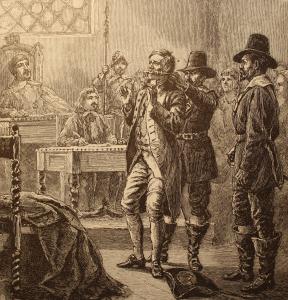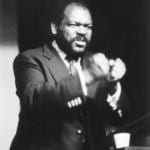They were rude, their words were crude. Occasionally, a few went nude.
The Quakers reached New England in July 1656. Ann Austin and Mary Fisher arrived from Barbados and were promptly arrested. Their persecutors “stripped them stark naked, not missing head nor feet, searching betwixt their toes, and amongst their hair, tewing [pulling] and abusing their bodies more than modesty can mention.” (This is not I meant by “a few went nude.” Several Quakers went naked in imitation of the Prophet Isaiah, who had walked about barefoot and without clothes for three years). The Boston authorities detected no signs of witchcraft. They burned Austin and Fisher’s books and shipped them back to Barbados. Two day later, a larger group of missionaries arrived.

So began a struggle between the Friends and New England authorities (Rhode Island excluded, for the most part) that raged for five years, simmered for several more decades, and continued in some forms until the Congregational establishments of Connecticut and Massachusetts finally went by the wayside in the early nineteenth century. The Friends offered a sharp theological critique of existing forms of English Protestantism. Whereas Congregationalists (Independents) and Presbyterians wanted to purify the sacraments from what they understood as unbiblical, Catholic corruption, the Quakers dispensed with baptism and the Lord’s Supper entirely. For them, the light of Christ within mattered more than the letter of the Bible, and the Friends questioned a host of Protestant verities about everything from the Trinity to male leadership.
Theology aside, though, the Quakers caused offense in all sorts of ways. They addressed magistrates and judges with “thee” and “thou” rather than the more formal “you.” This makes no sense to contemporary English speakers, for whom “thee” and “thou” sound terribly formal. But in seventeenth-century English, “thou” was the more familiar form of address. In the Geneva and King James translations of the Bible, men spoke to God with “thou” and “thy.” How, the Quakers reasoned, could they possibly address mere mortals as “you”?
Especially when dragged into court, Friends sometimes called magistrates by their given names. “Thomas,” the especially truculent missionary Humphrey Norton informed Thomas Prence, Plymouth Colony’s governor, in 1658, “thou art a malicious man.”
The offenses piled up. Quakers would not remove their hats in the presence of alleged superiors, another testimony to their belief in the equality of men. They refused to swear oaths, as some separatists and Baptists did as well. They denounced ministers as “hireling priests.” They urged townspeople not to pay church taxes. In their own meetings, Quakers might have sat in silence (although that was not yet standard practice in the 1650s), but in public, they knew how to raise a ruckus.
That ruckus precipitated a harsh response, most notably in Massachusetts Bay, whose authorities executed four Quakers between 1659 and 1661. The Quakers endured persecution in other colonies as well. Humphrey Norton was whipped in Plymouth Colony and branded on the hand in New Haven. The mistreatment of Quakers is one reason why Americans associate puritanism with religious intolerance. That reputation is deserved, but it is worth considering for a moment that the Quakers endured persecution on both sides of the Atlantic in many different jurisdictions. In most respects, they fared better under Oliver Cromwell’s Protectorate than they did during the early years of the Restoration. Scores of Quakers died in English prisons in the 1660s, 1670s, and early 1680s.
Quaker persistence, in particular the willingness of Friends to endure harsh punishments, exposed fissures within the New England establishment. Most non-Quakers very much disliked the Friends, but in all of the puritan colonies there were bitter disagreements about how to respond to them. The Friends simply refused to give in until their enemies gave up.
Humphrey Norton is a quintessential example. After he reached Rhode Island in 1657, he heard that Quaker missionaries had been arrested and banished from Plymouth Colony (although not after convincing a number of inhabitants of the Light of Christ). Norton promptly went to Plymouth himself and confronted Thomas Prence. Banished from Plymouth, he went to an English settlement on Long Island and denounced its minister. He was arrested and brought to haven, shackled for three weeks, and, after vituperative courtroom speeches, branded on the hand with an H for heresy. Norton soon went back to Plymouth, whose leaders were tiring of the charade. What could they do? If they jailed him, Norton wouldn’t pay the fees that typically accompanied imprisonment. Why should the settlers pay to feed him? Had they sentenced him to forced labor, he wouldn’t have done it. Had they whipped him, he would have endured it. (Norton later suffered a terrible thrashing in Boston). It seems that Plymouth’s magistrates contemplated a charge of heresy against Norton, which might have justified a severe whipping or the cropping of his ears. Eventually, however, the authorities grew tired and sent Norton and a companion back to Rhode Island.
Plymouth Colony tried several other ways of reforming Quakers. The colony’s General Court authorized individuals to attend Quaker meetings in order to “reduce them from the error of their ways.” They stripped Friends of their right to vote or hold office. They seized property to satisfy church taxes. They fined Quakers for unauthorized marriages. Nothing worked. Only a small minority of the colony’s English settlers became convinced (the Friends preferred the term “convinced” to “converted”). Most other settlers disliked the Friends, and there was another surge of anti-Quaker animus during and after King Philip’s War because some Friends refused military service.
At the same time, most settlers concluded that harsh measures against Quakers were of no use and were themselves repugnant. The colony’s ministers periodically urged the magistrates to take more serious steps to extirpate alleged heresy, but those magistrates generally demurred. Many communities even gave up punishing the Friends over the issue of church taxes, though the issue reemerged when Plymouth Colony became part of a larger Massachusetts Bay in 1692.
The Quakers mounted a sustained, non-violent protest against the New England religious establishment. At times, they courted punishment in order to more forcefully critique it. At other times, they found quiet ways of absenting themselves from militia duty and church taxes. In almost all instances, they refused to compromise their principles. They were in it for the long haul and wore down their political opponents.













